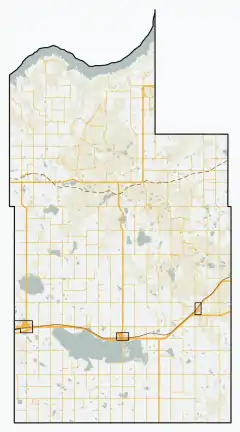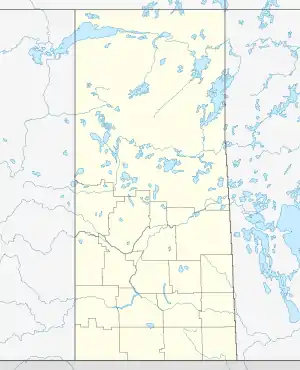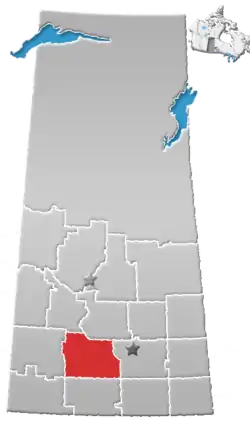Ernfold
Ernfold (2016 population: 15) is a village in the Canadian province of Saskatchewan within the Rural Municipality of Morse No. 165 and Census Division No. 7. At first alongside the original two-lane highway, the village was enclosed by the opposing lanes of the divided Trans-Canada Highway in 1973. In order to avoid complete destruction of the village the eastbound lane of the Trans-Canada Highway was rerouted approximately 3 km south of the village, leaving the village sandwiched between the Trans-Canada.
Ernfold | |
|---|---|
| Village of Ernfold | |
 Ernfold  Ernfold | |
| Coordinates: 50.448°N 106.892°W | |
| Country | Canada |
| Province | Saskatchewan |
| Rural municipality | Morse No. 165 |
| Government | |
| • Type | Municipal |
| • Governing body | Ernfold Village Council[1] |
| • Mayor | Christine Bauck |
| • Administrator | Mark Wilson |
| • MLA | Lyle Stewart |
| • MP | Jeremy Patzer |
| Area | |
| • Total | 1.19 km2 (0.46 sq mi) |
| Population (2016) | |
| • Total | 15 |
| • Density | 12.6/km2 (33/sq mi) |
| Time zone | UTC-6 (CST) |
| Postal code | S0H 3C0 |
| Area code(s) | 306 |
| Highways | |
| Railways | Canadian Pacific Railway |
| [2][3][4][5] | |
The village's population peaked at around 300 citizens.[6]
History
Ernfold incorporated as a village on December 4, 1912.[7]
Demographics
In the 2016 Census of Population conducted by Statistics Canada, the Village of Ernfold recorded a population of 15 living in 8 of its 13 total private dwellings, a -100% change from its 2011 population of 30. With a land area of 1.19 km2 (0.46 sq mi), it had a population density of 12.6/km2 (32.6/sq mi) in 2016.[10]
In the 2011 Census of Population, the Village of Ernfold recorded a population of 30, a -14.3% change from its 2006 population of 35. With a land area of 1.19 km2 (0.46 sq mi), it had a population density of 25.2/km2 (65.3/sq mi) in 2011.[11]
Heritage sites
First and foremost the most significant historical heritage site in Ernfold is the 80km sign. The Ernfold School is a stately red brick, 1 1⁄2-story Georgian Revival structure built in 1919. The building served as an integral part of the community as a school until it closed in 1972. It was then used as a Baptist church for a short time until the church closed in 1989.
The schoolhouse remains a notable landmark with its bell tower and symmetrical form, to passersby through the village, driving westbound on the Trans-Canada Highway.
On May 6, 1990 the Village of Ernfold passed (Bylaw No. 90-1), placing the building on the Canadian Register of Historic Places as a Municipal Heritage Property.[12]
References
- Ernfold Village Council
- National Archives, Archivia Net, Post Offices and Postmasters, archived from the original on 2006-10-06
- Government of Saskatchewan, MRD Home, Municipal Directory System, archived from the original (– Scholar search) on November 21, 2008
- Canadian Textiles Institute. (2005), CTI Determine your provincial constituency, archived from the original on 2007-09-11
- Commissioner of Canada Elections, Chief Electoral Officer of Canada (2005), Elections Canada On-line, archived from the original on 2007-04-21
- Richardson, Mark (2012-07-24). "Decline and development of the prairie". Maclean's. Retrieved 2017-01-19.
- "Urban Municipality Incorporations". Saskatchewan Ministry of Government Relations. Archived from the original on October 15, 2014. Retrieved June 1, 2020.
- "Saskatchewan Census Population" (PDF). Saskatchewan Bureau of Statistics. Archived from the original (PDF) on September 24, 2015. Retrieved May 31, 2020.
- "Saskatchewan Census Population". Saskatchewan Bureau of Statistics. Retrieved May 31, 2020.
- "Population and dwelling counts, for Canada, provinces and territories, and census subdivisions (municipalities), 2016 and 2011 censuses – 100% data (Saskatchewan)". Statistics Canada. February 8, 2017. Retrieved May 30, 2020.
- "Population and dwelling counts, for Canada, provinces and territories, and census subdivisions (municipalities), 2011 and 2006 censuses (Saskatchewan)". Statistics Canada. June 3, 2019. Retrieved May 30, 2020.
- Ernfold School - Canadian Register of Historic Places

